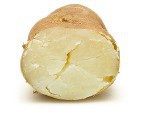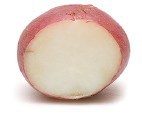Braised Red Potatoes
Ingredients
- 680 g red potatoes
- 2 c water
- 3 T butter
- 3 cloves garlic (peeled)
- 3 fresh thyme sprigs
- 3/4 t salt
- 1 t lemon juice
- 1/4 t freshly ground black pepper
- 2 T minced chives (fresh)
Method
with Lemon and Chives
1. Arrange potatoes in single layer, cut side down, in 12" nonstick skillet. Add water, butter, garlic, thyme sprigs, and salt and bring to simmer over medium-high heat. Reduce heat to medium, cover, and simmer until potatoes are just tender, about 15 minutes.
2. Remove lid and use slotted spoon to remove garlic to cutting board; discard thyme. Increase heat to medium-high and vigorously simmer, swirling pan occasionally, until water evaporates and butter starts to sizzle, 15 to 20 minutes.
3. Once cool enough to handle, mince garlic to paste. Transfer paste to bowl and stir in lemon juice and pepper.
4. Continue to cook potatoes, swirling pan frequently, until butter browns and cut sides of potatoes turn spotty brown, about 4 to 6 minutes longer. Off heat, add garlic mixture and chives and toss to thoroughly coat. Serve immediately.
Variation: with Dijon and Tarragon
Use 2 tsp Dijon mustard and 1 Tbsp minced fresh tarragon in place of the lemon juice and chives.
Notes
SJ Note: Idea is to simmer for total of 35 minutes; they found this gave the potatoes a silky interior. Then you uncover the pan, evaporate off the water, and brown and crisp the crusts of the potatoes.
SJ Note 22 Jul 2017: Very good! Tasty. Creamy, just as promised.
Notes from Source:
For a simple, one-pot potato side dish that featured the benefits of both boiling and roasting, we had to get creative. We combined halved small red potatoes, butter, and salted water in a 12-inch skillet and simmered this mixture until the potatoes turned creamy and the water fully evaporated. In the then-dry skillet, the potatoes and butter were left alone to fry and develop great flavor and color. Subtle aromatics like thyme and garlic balance well with last-minute additions like lemon juice.
Technique: The Benefits of Overcooking Waxy Potatoes
The rules for cooking potatoes seem pretty straightforward: Undercook them and they’ll stay intact; overcook them and they’ll break down into crumbly bits. But while developing our Braised Red Potatoes recipe, we allowed a batch of halved red potatoes to simmer for 35 minutes (by which point I expected them to be overcooked) and noticed that they not only stayed intact but actually cooked up incredibly creamy and smooth. Had we been wrong about the effects of overcooking potatoes in general, or was there something different about the low-starch red kind?
EXPERIMENT
We prepared two batches of my working recipe, one with low-starch red potatoes and another with high-starch russets (quartering these larger spuds) and simmering each for 35 minutes.
RESULTS
Just as they had before, the red potatoes held their shape and boasted remarkably silky interiors. The russets, however, broke down and turned crumbly and mushy.
EXPLANATION
A little-known but key difference between waxy potatoes (red or new potatoes) and starchy potatoes (russets) is that they contain different ratios of two different starches: amylopectin and amylose. Waxy potatoes contain very little amylose; as they cook, the starch granules in waxy potatoes burst, releasing very sticky amylopectin, which in essence glues the potato structure together, giving the impression of creaminess. In a russet or other starchy potato, there is a higher ratio of the second starch—amylose—which is made up of smaller molecules that are less sticky. Despite the fact that, overall, russets contain more starch than do waxy potatoes (hence they are often described as being “high starch”), russets simply fall apart once overcooked since most of the starch is the less sticky amylose.

CRUMBLY: Overcooked starchy russets break apart.

CREAMY: Overcooked waxy new potatoes hold together.